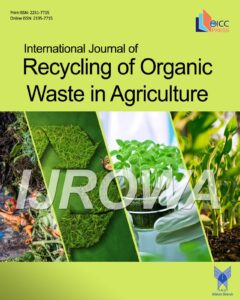
Introduction In Europe, because of the high production levels of livestock farming in general and pig farming in particular, animal waste management has become increasingly important to comply with the required lowering of livestock farming environmental pressure. Usually manures undergo solid/liquid separation, which generates one clarified liquid fraction and one nutrient-rich solid fraction suitable for […]
Background The effects of microbial inoculation with two commercial inoculants and mature compost on the composting of household organic wastes were investigated using five 200-L passive aeration compost bins. Food scraps and dry leaves (1.6 kg total) with a ratio of 1:0.14 (wet weight) were added to each bin once a day, for 60 days, […]
Background Over the years, the use of organic materials in farming has reduced due to the increase in the use of chemical fertilizers which are rich in readily available plant nutrients. Intensive use of inorganic fertilizers may have depressing effect on yield of watermelon. Field experiment was conducted at the Teaching and Research Farm, Kwara […]
Background Majority of the post-harvest agri-residues from agricultural activity in Punjab, India, is burnt in the field resulting in the loss of soil fertility and release of large amounts of air pollutants. In an effort to reutilize the selenium-accumulated waste wheat and paddy straw from seleniferous region of Punjab, two varieties of edible mushrooms, Pleurotus […]
Background A study was carried out to classify municipal solid waste (MSW) compost produced in Delhi, India for their marketability and use in different area with respect to physico-chemical properties, fertilizing and heavy metal polluting potentials. Results The pH of the compost was slightly alkaline (8.4 ± 0.02) and C:N ratio (9.46 ± 0.91) was […]
Background Mushroom wastes are widely left from mushroom production industries and have been supposed to possess prebiotic, antimicrobial, antifungal and antioxidant properties. Due to difficulties with using antibiotic growth promoters in poultry diet, mushroom wastes seem to be a proper substitute for them. Therefore, present experiment was carried out to investigate the effect of oyster […]
Background The utilization of organic fertilizer is an effective method in organic culture of medicinal plants because of its beneficial effects on soil structure, reduction of environmental problem and improvement in plant growth. The experiments were conducted in a research field at the University of Guilan at the Rasht and Torbat-e-Jam Razavi Khorasan Province, Iran. […]
Introduction Total coffee production in the world in 2013 was 8.7 million Mg of coffee beans. Coffee must be processed after harvest to separate beans from the husk, and the post-harvest process can generate different types of residues. Knowing that 50 % of the harvested coffee is husk, it is important to consider that these […]